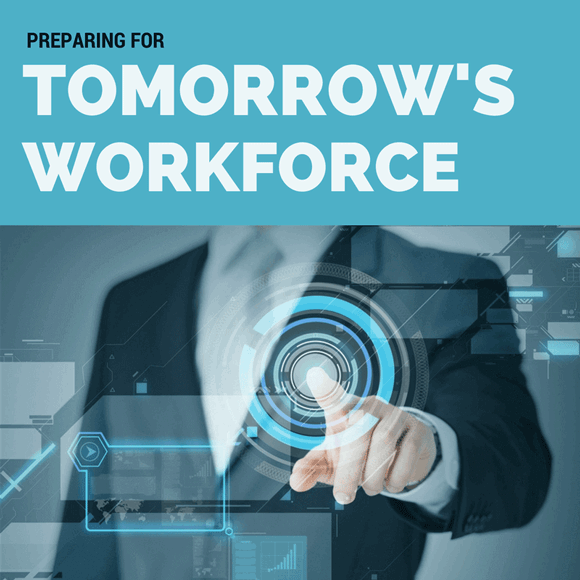Post Date: 08/15/2017
Your new workers are here. Are you ready?
In less than a decade, Millennials — those born between 1981 and 2000 — will make up 75 percent of the global workforce. For the first time in history, there will be five generations at work together. Many experts say that this emerging multigenerational workforce will transform business. Organizations and HR professionals must be ready for major changes on how to attract, incentivize, and retain employees, as well as how to create a culture that resonates with this new breed of employee. Human resource professionals will be at the forefront in preparing organizations for seismic shifts within the workforce. Here is a look at what the near future may hold for three critical functions of HR.
Recruiting
Finding talent will remain the most consuming function for most HR professionals. With technology, automation, and AI, some jobs will become obsolete; while others will be created that require new and different skill sets. Social media platforms have given big and small companies almost equal access to talent, and many barriers have been removed in identifying potential new hires. The key difference in securing talent is often speed and agility. Candidates, in particular, millennials, are not willing to wait for weeks as their resume winds its way through the management of the hiring organization. To remain competitive in securing talent for the future, companies should consider the following:
- Implement a streamlined and rapid hiring process without compromising quality.
- Broaden the recruiting pool to other states or countries.
- Identify any positions that can be job-shared or accomplished remotely.
- Offer internship and apprenticeship programs to develop the skills of future workers.
- Retain specialized outside sources to maintain access to a consistent pool of skilled workers.
Compensation
Standard compensation packages have not evolved much since the invention of the 401K plan. The typical mixture of salary, health care, incentives, and amenities has remained relatively unchanged, but for many millennials, a paycheck alone is not a compelling reason to join or stay with a company. Building a new compensation structure requires some creative thinking and listening to the wants and needs of the emerging workforce. These components of compensation will see considerable changes shortly:
- Pay scales– Broad, generic pay scale bands were common when employees stayed with the same company or even the same job for their entire career. Many companies still implement annual incremental, lockstep pay increases and wonder why their employees plod along like zombies. To truly tap into the dynamic energy of the future workforce, compensation packages must be recreated and personalized. Certain employees may be more likely to feel rewarded by incentive pay, promotions, base pay, or retirement packages. Younger employees are also more inclined to talk about their pay with coworkers and be highly concerned with fairness and equity in salaries.
- Development opportunities— Millennials are notorious for demanding opportunities for advancement and career growth. That said, development and advancement are not necessarily synonymous with a promotion. It may mean allowing the opportunity for cross-team projects, providing learning opportunities, or creating a mentorship or training program.
- Incentives–Stock options, company sponsored sabbaticals, flexible work schedules, vacation time, work from home options, career planning assistance – incentives have been shown to promote a higher level of productivity and foster a company culture. A unique and well-received incentive can also bolster a company’s recruiting efforts through word of mouth and social media sharing.
Engagement and Retention
Studies show that organizations with an engaged workforce have higher profitability and a stronger brand than those that don’t. For older generations, work is often seen as an unglamorous necessity to earn money and provide for basic needs. For the workforce of the future, a job is more than a means to support a lifestyle. Here are key features that new employees are looking for in their employers:
- Culture– Millennials expect that their work will provide them with a sense of dignity, status, and even identity. Many organizations have created a culture that makes employees feel they have opportunities to grow and evolve in their careers, allows flexibility to achieve work/life balance, and engages employees and managers through technology.
- Connection– New workers will bring their social media practices into the workplace and expect the same sort of connectivity with their co-workers. Social and mobile technologies should provide new employees with access to their co-workers who can offer guidance and act as cultural role models. Using internal social platforms and connecting your employees to individuals and teams will be far more effective than a handbook or FAQ page.
- Consumer experience– Millennials are the fastest-growing group of consumers and have learned to expect personalized treatment as retailers use increasingly sophisticated consumer analytics. This experience and expectation have spilled into their work life, and Millennials expect a personalized working experience, immediate feedback, and interactive platforms to accomplish their duties.











